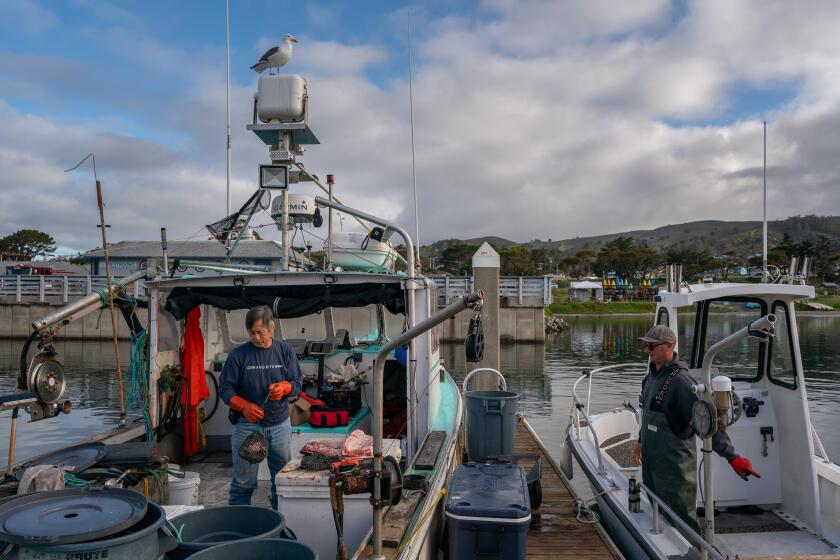Iraq’s marshes are dying a second death
Vast lakes have shriveled. River beds have run dry. The animals are sick, the birds have flown elsewhere and an ancient way of life is facing a new threat to its existence. The fabled marshes of southern Iraq are dying again -- only this time the forces of nature, not the hand of man, are to blame.
The man-made death came in the 1990s, when Saddam Hussein deliberately drained the marshes to prevent their use by guerrillas, some infiltrating from Iran.
After Hussein was toppled in the U.S.-led invasion of 2003, Iraqis rushed to breach the dikes he had erected, and tens of thousands of marsh dwellers who had fled returned to their homes.
Now a devastating drought threatens their livelihoods as farmers and fishermen.
“What was once described as the Garden of Eden, the cradle of civilization, has been changed to desert and to a cradle of disease, poverty and suffering,” said Ali Hool, 52, a sheik from the marshes who led a demonstration recently in Nasiriya to demand that the government take action to assist the stricken residents.
The drought of the last two years has taken a heavy toll on Iraq, a country of vast deserts traversed by the mighty Euphrates and Tigris rivers. But perhaps nowhere has its effect been more profound than in these ancient marshes, where the rivers’ tributaries converge and multiply on the last leg of their journey toward the sea, creating one of the largest wetlands in the world.
People have built their lives around the unique ecosystem for thousands of years, fishing, raising water buffaloes for milk and cheese, and living in huts woven from marsh reeds. The Marsh Arabs, who believe their land is the place where the Bible says life began, are reputed to be descended from ancient Sumerians, who predate the arrival of Arabs in the area by thousands of years.
Now the fish have died again, the buffaloes are sick, and the reeds on which they feed have withered away. Many residents say they don’t know if they can continue living here.
Muntadar Raykan, 18, and his family were forced out of the area during Hussein’s rule but returned in 2004. Now, as the drought drags on, they are on the move again. He and his five younger brothers recently left their parents’ home to travel deep into the marshes in search of water to sustain their three remaining buffaloes. The family has been forced to sell eight other buffaloes to survive.
“I will leave the area if things get worse. I will leave forever,” Raykan said as he stood by the new hut of reeds he had woven for him and his brothers to live in. “No solution is looming. If we stay here, and the quantity and quality of water continues to get worse, we and our animals will die.”
Though drought is the overriding factor in the Marsh Arabs’ plight, government officials also blame Turkey, Syria and Iran, which have stemmed the flow of the Euphrates and Tigris into Iraq as they grapple with their own droughts. Ankara and Baghdad haggled for weeks over water rights before striking a deal in mid-September that will increase the flow to Iraq for one month. But it offers no long-term solution.
Turkey and Syria have built dams along the headwaters of the Euphrates and reduced the flow to less than a third of Iraq’s needs, said Water Resources Minister Abdul Latif Rashid. And Iran has used dams and dikes to block tributaries of the Tigris, he said.
“This is an important and serious factor,” said Rashid, who is trying to negotiate formal water-sharing agreements with Iraq’s neighbors. “The control of these structures is not in our hands. They have a very damaging effect on our water flow.”
It’s not just the reduced water level that’s a problem. Because many tributaries no longer reach the sea, salt water is leaching into the marshes, rendering the waters undrinkable.
Moreover, water that should be circulating has gathered in stagnant pools, allowing harmful bacteria to breed and killing the microorganisms on which fish feed. Many marsh dwellers say their buffaloes are going blind, the female animals producing only a fraction of the milk they used to.
People who long lived off the land now must buy food and bottled water, and many have resorted to selling their buffaloes for cash.
“Before, when a guest came to visit, I would just go outside my hut, throw my fishing hook, bring out a good fish and make lunch!” said Shnawa Abood, 60, who was shopping in the local market after selling several of his animals.
Abood even buys water to dilute the salty marsh water for his remaining stock to drink. “You can’t imagine how important our buffaloes are to us! You can’t imagine how sad we are when we are forced to sell one of them,” he said.
People who used to supplement their incomes by selling milk and cheese and reed mats and baskets are hurting, said Jassim Asadi of Nature Iraq, a nonprofit conservation group working with the Marsh Arabs.
Moreover, the marshes used to provide two-thirds of the fish consumed in Iraq; now frozen fish from Iran are sold at the local market, with hardly any marsh fish to be found.
“Chibayish, a place of reeds, fish and birds, is selling imported fish in its markets,” Asadi said. “It is an economic disaster.”
Many marsh dwellers have left for a second time , heading to nearby cities such as Basra, where they join the multitudes of unemployed desperate to find work in a sluggish economy.
Others who failed to adjust to life in the urban areas when they were forced out by Hussein vow they will stay, hoping that rains this coming winter will reverse their fortunes.
For Saleh Abu Hail, 42, who left in the 1990s, relocating again looks like a poor option. About 40 neighboring families in his village on the edge of the marshes have already left, but he can’t contemplate giving up his lifestyle yet again.
“It was a dream for us to come back here,” he said as he gathered reeds on one of the last surviving tributaries, nearly 10 miles from his home. “How can we leave it now?”
--
Times staff writer Liz Sly contributed to this report.
More to Read
Start your day right
Sign up for Essential California for news, features and recommendations from the L.A. Times and beyond in your inbox six days a week.
You may occasionally receive promotional content from the Los Angeles Times.






